Share
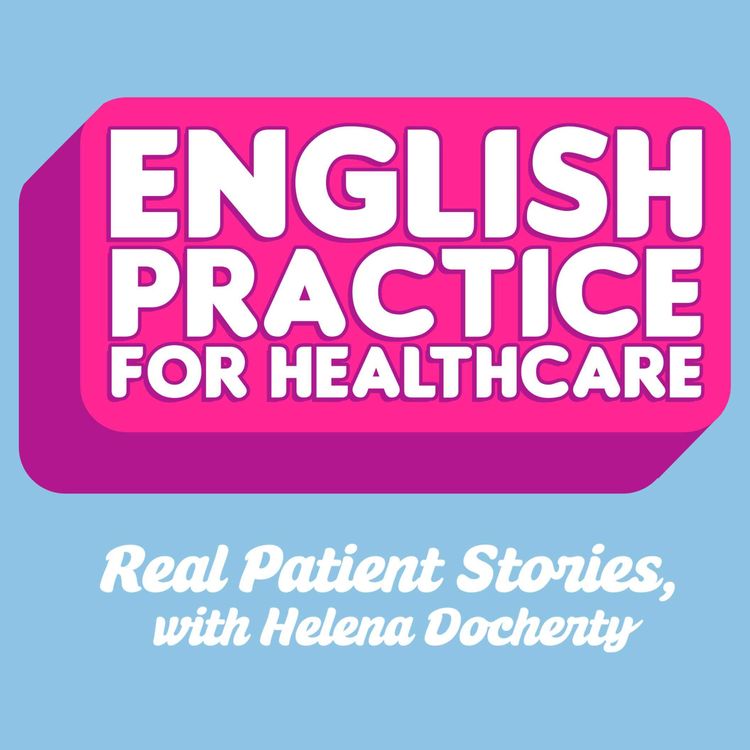
English Practice For Healthcare
English Practice For Healthcare - Episode 07
Disclaimer: please note this episode contains quite graphic descriptions of medical procedures involving bones.
This is part two of the interview with Kevin, which covers the theme of broken bones. In this episode you can learn more about how external fixators work in orthopaedic surgery and about some of the adaptations people have to make to daily life with these on. Including to the clothes they wear! There is another example of an idiom and more opportunities to hear some descriptive language about pain. Kevin’s re-telling of his experience also gives us an opportunity to reflect on if it is appropriate for healthcare professionals to cry in front of patients. What do you think? Please feel free to email me with your opinion.
As always please note this is not a source of medical advice or intended for you to use to make medical decisions it is designed to help you improve your English through authentic language input. The opinions expressed are entirely those of the speakers and do not necessarily reflect the opinions of the UK health service or any other health organisations or charities.
Please do feel free to email me, helena@englishpracticeforhealthcare.com if you have any English language questions and remember you can read the free transcript for this episode at English Practice For Healthcare (squarespace.com)
#learnenglish #intermediateenglish #advancedenglish #ukenglish #medicalenglish#patientcare #communicationskills #englishpractice #oet #occupationalenglishtest#englishfordoctors #englishfornurses #languagelearning #englishlanguagepodcast#learnenglish #englishpractice #listeningskills #orthopeadic #skiing #morphine #surgery#operation #anaesthetic#englishverbs #brokenbone #fracture #physiotherapy #osteoarthritis
More episodes
View all episodes
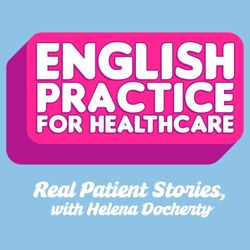
10. English Practice For Healthcare - Episode 10
25:30||Season 1, Ep. 10In the tenth episode of English Practice for Healthcare we hear from George and Theresa about George’s experience of type 2 diabetes. Every healthcare professional will come across a patient with either type 1 or type 2 diabetes and this long-term condition needs to be considered when formulating their care plan. Diabetes is an area of healthcare in its own right and in both a community and hospital environment there will be specialist teams you can consult for support in caring for patients with diabetes. In this episode you will hear about the relationship of type 2 diabetes to the food we eat as well as the importance of diabetic eye screening and footcare. It’s an excellent opportunity as well to hear the regional accent of Lancashire.For more information about diabetes please visit the website for the UK charity Diabetes UK. They have a podcast where you can listen and learn about lots of different topics:Search | Diabetes UKIn the episode we discuss a group of medications called ‘Flozins’. You can read the NHS website for more information on these. Please note there are different types available: about dapagliflozin - NHS (www.nhs.uk)This is not a source of medical advice or intended for you to use to make medical decisions it is designed to help you improve your English through authentic language input.The opinions expressed are entirely those of the speakers and do not necessarily reflect the opinions of the UK health service or any other health organisations or charities.Please feel free to email me, helena@englishpracticeforhealthcare.com if you have any English language questions, a suggestion for a future episode or are interested in working together.#learnenglish #intermediateenglish #advancedenglish #ukenglish #medicalenglish #patientcare #communicationskills #englishpractice #oet #occupationalenglishtest #englishfordoctors #englishfornurses #languagelearning #englishlanguagepodcast #learnenglish #englishpractice #listeningskills #diabetes #diabetesuk #eyescreening #feet #footcare #wounds #Englishvocabulary #fatigue #glucose #flozins #type2diabetes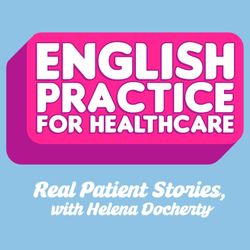
9. English Practice For Healthcare - Episode 09
35:14||Season 1, Ep. 9In my ninth episode there is the opportunity to hear three examples of different English idioms as you listen to Lynne and I’s discussion of her experience of the menopause. There are again many points you can reflect on, which means to think carefully about something and consider different possibilities, opinions, and approaches to something. Reflection is an important skill in healthcare, and it helps us to continuously improve the care we deliver. I recommend the UK organisation ‘The Menopause Charity’ to complete some further study and to practice your English reading skills. They have some fantastic resources, specifically for healthcare professionals. Please see the link below.Please note this is not a source of medical advice or intended for you to use to make medical decisions it is designed to help you improve your English through authentic language input. The opinions expressed are entirely those of the speakers and do not necessarily reflect the opinions of the UK health service or any other health organisations or charities.Please feel free to email me, helena@englishpracticeforhealthcare.com if you have any English language questions, a suggestion for a future episode or are interested in working together.The Menopause Charity - Menopause Facts, Advice and SupportEnglish Practice For Healthcare (squarespace.com)#learnenglish #intermediateenglish #advancedenglish #ukenglish #medicalenglish #patientcare #communicationskills #englishpractice #oet #occupationalenglishtest #englishfordoctors #englishfornurses #languagelearning #englishlanguagepodcast #learnenglish #englishpractice #listeningskills #menopause #hormonereplacementtherapy #hrt #englishverbs #anxiety #idioms #menopausesymptoms #perimenopause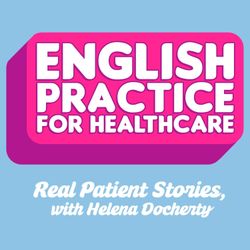
8. English Practice For Healthcare - Episode 08
30:38||Season 1, Ep. 8In this episode you can continue to build on your knowledge of the storytelling tenses for past events used in English from the last two episodes. Anne, like Kevin is describing something that happened over 10 years ago. Also, like Kevin, she can remember what happened in great detail as she shares a very significant health event in her life, having a stroke. There is the opportunity to reflect on the different ways stroke and stroke recovery affect people and use this as a platform for your own learning into the role of occupational therapists in modern day healthcare. Please see a link below to the NHS website to start this. There is also a link to the website of the Stroke Association. This is an excellent charity in the UK that raises awareness of stroke and offers support and reliable information to anyone who needs it. Also see the link to my website if you would like to read along using the transcript, while you listen. Enjoy!Please note this is not a source of medical advice or intended for you to use to make medical decisions it is designed to help you improve your English through authentic language input. The opinions expressed are entirely those of the speakers and do not necessarily reflect the opinions of the UK health service or any other health organisations or charities.Please do feel free to email me, helena@englishpracticeforhealthcare.com if you have any English language questions.Occupational therapy - NHSStroke Association | Rebuilding lives for stroke survivorsEnglish Practice For Healthcare#learnenglish #intermediateenglish #advancedenglish #ukenglish #medicalenglish#patientcare #communicationskills #englishpractice #oet #occupationalenglishtest#englishfordoctors #englishfornurses #languagelearning #englishlanguagepodcast#learnenglish #englishpractice #listeningskills #stoke #seizures #bloodpressure #englishverbs #OT #occupationaltherapists #occupationaltherapy #strokeassociation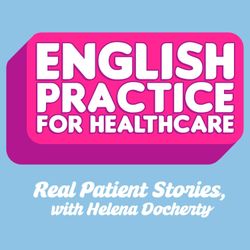
6. English Practice For Healthcare - Episode 06
26:41||Season 1, Ep. 6Disclaimer: please note this episode contains quite graphic descriptions of surgery.In the sixth episode we hear from Kevin about how he seriously broke his leg while skiing in France. You can hear lots of useful examples of the simple past perfect and present perfect continuous tense. This is because these tenses are often used when we are retelling a story of something that happened in the past. This is part one of this two-part interview with Kevin as there was too much to include in just one episode! Kevin unfortunately had to have two surgeries to his broken leg. Listen to find out what he remembers from these surgeries and his skiing accident.As always please note this is not a source of medical advice or intended for you to use to make medical decisions it is designed to help you improve your English through authentic language input. The opinions expressed are entirely those of the speakers and do not necessarily reflect the opinions of the UK health service or any other health organisations or charities.Please do feel free to email me, helena@englishpracticeforhealthcare.com if you have any English language questions and remember you can read the free transcript for this episode at www.englishpracticeforhealthcare.com.#learnenglish #intermediateenglish #advancedenglish #ukenglish #medicalenglish #patientcare #communicationskills #englishpractice #oet #occupationalenglishtest #englishfordoctors #englishfornurses #languagelearning #englishlanguagepodcast #learnenglish #englishpractice #listeningskills #orthopeadic #skiing #morphine #surgery #operation #anaesthetic #englishverbs #brokenbone #fracture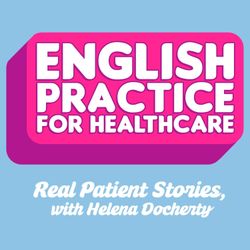
5. English Practice For Healthcare - Episode 05
28:08||Season 1, Ep. 5In this episode you have the opportunity to hear a strong example of a Yorkshire accent. Mark talks about being gluten intolerant, what symptoms he gets if he consumes gluten, and he also teaches us a lot about the beer making process! I discuss the importance of the terminology and language we use when talking about conditions that require patients to follow a gluten free lifestyle. For example, coeliac disease. For more information about these conditions please see the website of the charity Coeliac UK, which was very useful when I was researching this episode. Home - Coeliac UK Please do feel free to email me, helena@englishpracticeforhealthcare.com if you have any English language questions and remember you can read the free transcript for this episode at www.englishpracticeforhealthcare.com . Please note this is not a source of medic al advice or intended for you to use to make medical decisions it is designed to help you improve your English through authentic language input. The opinions expressed are entirely those of the speakers and do not necessarily reflect the opinions of the UK health service or any other health organisations or charities. #learnenglish #intermediateenglish #advancedenglish #ukenglish #medicalenglish #patientcare #communicationskills #englishpractice #oet #occupationalenglishtest #englishfordoctors #englishfor nurses #languagelearning #englishlanguagepodcast #learnenglish #englishpractice #earinfection #coeliac #noncoeliacglutensensitivity #glutenfree #fatigue #lethargy #foodintolerance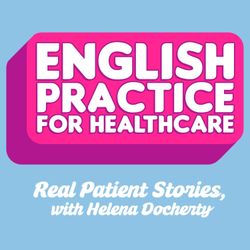
4. English Practice For Healthcare - Episode 04
27:28||Season 1, Ep. 4Disclaimer: Please note there is one instance of swearing in this episode used by the interviewee in a description of his ear issues.In the fourth episode you can learn about ear problems, the language used to describe having an ear infection and hear how this affects Jack in his day-to-day life. There is some useful language on describing pain and how to talk about different types of pain in more detail. You can also hear about Jack and I’s own experience of visiting a healthcare centre in a country where English was not the first language. Other useful language tips include what to say when you interrupt someone and an example of ‘sarcasm’.As always please note this is not a source of medical advice or intended for you to use to make medical decisions it is designed to help you improve your English through authentic language input. The opinions expressed are entirely those of the speakers and do not necessarily reflect the opinions of the UK health service or any other health organisations or charities.Please do feel free to email me,helena@englishpracticeforhealthcare.com if you have any English language questions and remember you can read the free transcript for this episode at www.englishpracticeforhealthcare.com.#learnenglish #intermediateenglish #advancedenglish #ukenglish #medicalenglish#patientcare #communicationskills #englishpractice #oet #occupationalenglishtest#englishfordoctors #englishfornurses #languagelearning #englishlanguagepodcast#learnenglish #englishpractice #earinfection #ears #otoscope #earnoseandthroat #ent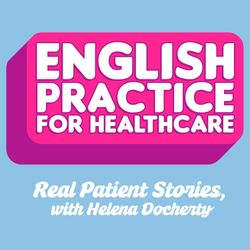
3. English Practice For Healthcare - Episode 03
26:37||Season 1, Ep. 3In the third episode you can improve your listening skills and your range of vocabulary to talk about Crohn’s disease. Vicky gives an honest account of Crohn’s diagnosis, how it made her feel and her experience of different treatments. She talks about the different healthcare professionals she worked with, including research nurses and Registrars. Registrars are doctors that are in their training to become specialists in a certain area of medicine. They have a number of years’ experience of being a doctor already and have now decided what area of healthcare they wish to specialise in. Please see a link below to Crohn’s and Colitis UK, which is a charity that campaigns to raise awareness of these conditions for example, by increasing the level of research into treatments and causes. They have a phone number that patients can call for advice and a section on the website specifically for healthcare professions. Also, a link to my website! Please subscribe to the newsletter if you want more language explanations from the episodes and to hear more about future episodes.Please note this is not a source of medical advice or intended for you to use to make medical decisions. The opinions expressed are entirely those of the speakers and do not necessarily reflect the opinions of the UK health service or any other health organisations or charities.www.englishpracticeforhealthcare.comCrohn's & Colitis UK (crohnsandcolitis.org.uk)#learnenglish #intermediateenglish #advancedenglish #ukenglish #medicalenglish #colitis #ulcerativecolitis #crohn’s #colonoscopy #infliximab #patientcare #communicationskills #englishpractice #oet #occupationalenglishtest #englishfordoctors #englishfornurses #languagelearning #englishlanguagepodcast #learnenglish #englishpractice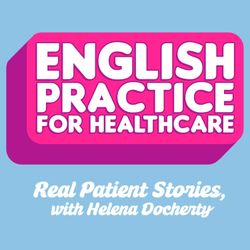
2. English Practice For Healthcare - Episode 02
24:24||Season 1, Ep. 2This is the second episode in a series of interviews with English speakers about their personal health experiences. They are designed to support your English language learning in the context of healthcare, especially your listening skills. In this episode I talk to Olga about her experience of Hyperemesis Gravidarum. She describes being diagnosed with this condition and in what ways it impacted her day-to-day life during pregnancy. There is a wide range of useful vocabulary on the topic of pregnancy, for example, ‘to be induced’ or ‘to have an induction’, which is the term for when labour is stimulated for a pregnant woman, often in the case that the baby has gone past its due date. You could visit the NHS website to read about this condition before you listen as a preparation exercise at Severe vomiting in pregnancy - NHS (www.nhs.uk).Please note this is not a source of medical advice or intended for you to use to make medical decisions. The opinions expressed are entirely those of the speakers and do not necessarily reflect the opinions of the UK health service or any other health organisations or charities. www.englishpracticeforhealthcare.com#learnenglish #intermediateenglish #advancedenglish #ukenglish #medicalenglish #pregnancysymptoms #morningsickness #midwife #HGV #hyperemesis #hyperemesisgravidarum #heartburn #patientcare #communicationskills #englishpractice #oet #occupationalenglishtest #englishfordoctors #englishfornurses #languagelearning #englishlanguagepodcast #learnenglish #englishpractice